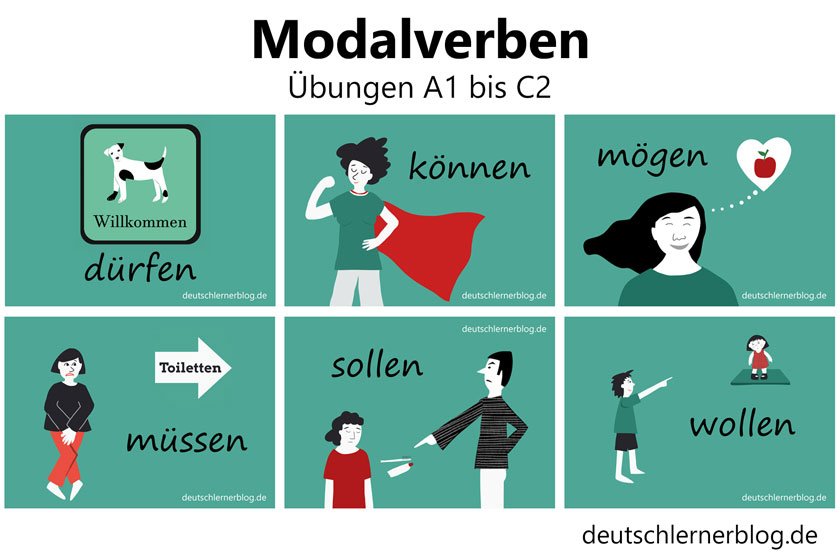Modal Verbs in German
Modal verbs describe the manner how something is done in more detail. This way you can describe actions or things you do more precisely. Instead of saying: "I go home" you can explain "I must go home." Now the other person knows more precisely what you think. The name Modal verbs can be remembered well if you think of the word "mode." When something is in a certain mode (e.g., in a computer game), then it's done in a certain way (two-player mode -> playing together).
Beginner Level
You already know many modal verbs. "I must hurry" or "You may not swim there." Actually, you're already a real expert! We want to systematize your prior knowledge step by step.

Exercise 1
Look at the pictures carefully and try to recognize how the people in the pictures do something. Remember that modal verbs describe the manner in which something happens in more detail.
dürfen (may/to be allowed to)
Most people, young and old, know this:
- "You may not do that!"
- "Dad said that I may not do that."
- "I was not allowed to drink much cola when I was little."
To be allowed to do something means that another person has not forbidden you from doing something. Or the other way around: if you may not do something, then another person has forbidden you to do it.
To be allowed or not allowed to do something means that you're dealing with a prohibition or a permission.
| Prohibition? | May I? | |
|---|---|---|
| 👍 | no prohibition | you may |
| 🚫 | prohibition | you may not |
Exercise 2
Think about school (or work), what rules are there. Are there things you may not do? List 3 such things.
Example
- "I may go to the bathroom during class."
- "I may not leave work before the end of working hours."
müssen (must/to have to)
Having to do something is, after permissions or prohibitions, probably one of the first words we internalize at school. Suddenly you have to be quiet or you have to sit still. You have to help more with household chores. You have to give up valuable playtime for homework. The older you get, the more duties come upon you. While as a child you get many prohibitions, as an adult you are often much freer. Prohibitions then appear in a completely different form. You no longer have to go to bed early, but you have to go to work early in the morning.
| Obligation? | Must I? | |
|---|---|---|
| ✔️ | obligation | you must |
| ❌ | no obligation | you don't have to |
Exercise 3
Think of 5 things you must do every day. Write them down and compare with a partner.
Example
- "I must brush my teeth."
- "I must go to school/work."
- "I must eat something."
können (can/to be able to)
Being able to do something refers to your abilities and skills. It can also refer to possibilities.
Examples:
- "I can swim." (ability)
- "I can speak German." (skill)
- "We can go to the cinema tonight." (possibility)
sollen (should/to be supposed to)
Should expresses expectations, recommendations, or obligations that come from others.
Examples:
- "You should eat more vegetables." (recommendation)
- "I should call my mother." (expectation)
- "Students should do their homework." (obligation)
wollen (want to)
Want to expresses your own wishes and desires.
Examples:
- "I want to learn German." (desire)
- "She wants to become a doctor." (goal)
- "We want to travel to Germany." (wish)
möchten (would like to)
Would like to is the polite form of "wollen" and is preferred in many situations.
Examples:
- "I would like a coffee, please." (polite request)
- "We would like to visit the museum." (polite wish)
Advanced Level
Modal Verbs in Different Tenses
Learn how modal verbs change in past tense and perfect tense:
Present: "Ich kann schwimmen." (I can swim.) Past: "Ich konnte schwimmen." (I could swim.) Perfect: "Ich habe schwimmen können." (I have been able to swim.)
Subjunctive Forms
Modal verbs in subjunctive (Konjunktiv) for polite requests:
- "Könnten Sie mir helfen?" (Could you help me?)
- "Dürfte ich Sie etwas fragen?" (Might I ask you something?)
Expert Level
Modal Verbs with Passive Voice
Understanding how modal verbs work with passive constructions:
- "Das muss gemacht werden." (That must be done.)
- "Das kann repariert werden." (That can be repaired.)
Regional and Stylistic Differences
Different German-speaking regions may use modal verbs slightly differently, and formal vs. informal contexts affect their usage.